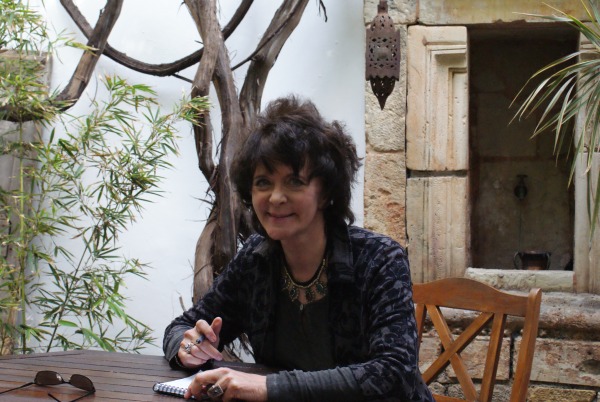You wrote your first poem when you were three, but didn’t decide that poetry was your thing until forty-three. What do you still remember about your first poem and why do you think it took such an extended period before you came round to the idea of being a poet?
The mindset, all the professionalism, is so different today. Even now, poetry being “my thing” and “being a poet” are very different beasts. Poetry was always “my thing”, but I didn’t know anyone who thought of poetry as a career. A career? Poetry? Poetry courses were unknown, anyway to me. I published my first pamphlet at 38, when I gave up tenure, teaching Greek at Birkbeck College, to support my writing by freelance work. Before that, I had been researching and writing what later became two books on ancient Greek poetry and religion, and ideas of what’s inside people.
You come from a family of scientists, and are the great-great-grandchild of Charles Darwin. Your mother said after coming to your first poetry reading: “I see the point of poets now. They notice things.” Do you agree that the skill of noticing is the point of poetry, or is it something else?
Noticing is one element in it. My mum said the point of poets, not poetry, and “the point” depends who’s speaking. I notice, now she’s 97 even though she was always a skeptical scientist, that she herself remembers a surprising lot of lines from poems she read as a child. Memorability: that’s one point, perhaps.
Your book The Mara Crossing is all about migration, looking at animals such as wildebeest, petrels and jellyfish, as well as people. How much have you found looking at the patterns and challenges of animals has aided your insight of humans?
It’s all part of the same thing, isn’t it? A two-way flow.
You worked on the ‘Music From the Genome’ project funded by the Wellcome Trust, which looked at the genetic characteristics of choral singers. Can you tell us a bit about that project and do you think it is likely that there is a poet’s gene?
It seems to me a frightful idea, a poet’s gene! They didn’t find one for music. So many different things go into making a musician – or a poet. Pattern-making, communicative gifts, expressiveness, empathy, thought, and above all imagination. One gene, I discovered in doing that project, is a lot about linkage, combining different characteristics and traits. After doing the gene research, the challenge of that project was meeting the composer’s demands for syllables and images – you can read about it here
http://www.musicfromthegenome.org.uk/writing_alle.html
In the introduction to your book 52 Ways of Looking at a Poem (2002), which cites Aldeburgh as part of a burgeoning festival scene, you said: “We are in the middle of a large-scale renaissance of poetry in Britain today”. To what extent would you say that this renaissance is still going in 2016, and if so do you feel it has developed at all since then?
It has changed hugely, because of the development of Creative Writing degrees. Writing that book, I explained that poetry in the UK had nothing to do with universities! Poets didn’t work in them, we were journalists, teachers, publishers, social workers (which was how Simon Armitage began). I remember Mike Donaghy applying for a job showing people round Highgate Cemetery. He lost the job after three days. I finished that book in 2001. In 2006, when I published that book’s successor, The Poem and the Journey, all I had to say about the poets whose poems I discussed, was which university they were teaching in. The UK university expansion of creative writing happened in those five years. Now we have had ten years of it, everything and everyone has become professionalized. Poetry collections are winning prizes, like the Guardian First Book award, which were never won by poets before. So yes, it has gone onward and upward. Doesn’t mean it’s easier for young poets, though. If anything, it’s harder, as it’s so much more competitive.
Your poem ‘Facing East’ is the finale to your collection Learning to Make an Oud in Nazareth ending with the line “Making is our defence against the dark”. The poem begins by focusing on Maggi Hambling’s ‘Scallop’ sculpture from Aldeburgh beach and shifts to consider conflict in the Middle East. To what degree would you say any artwork is a political “defence against the dark”?
I don’t think an art work is a defence against the dark so much as the making of it and thinking about it, enjoying it. A work which tries to be ‘political’ often fails to work as art. You have to make the poem as good as you can as a poem, as art, rather than bang on with its message. What I was thinking of, as our defence against the dark, is making and enjoying, whether it is painting, music or a poem, Believing in human effort, skill, imagination, beauty and creativity – that’s one hope against the forces of destruction.
Ruth is a British poet, novelist, conservatist, critic and author, first Writer in Residence at the Royal Opera House in Covent Garden. She teaches Poetry at Kings College London and has published nine poetry collections, a novel, and eight books of non-fiction including three on reading poetry. Her recent book The Mara Crossing/ ON MIGRATION is a mixed-genre meditation on migration in prose and poetry. Her awards include First Prize in the UK National Poetry Competition, a Cholmondeley Award from The Society of Authors, an Arts Council of England Writers’ Award and a British Council Darwin Now Research Award for her novel Where the Serpent Lives. She is a Fellow of the Royal Society of Literature, Member of the Bombay Natural History Society, Ambassador for New Networks for Nature, Patron of 21st-Century Tiger and Council Member of the Zoological Society of London.

Add your Reply
You must be logged in to post a comment.